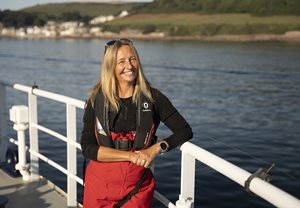Story
PML’s Prof. Pennie Lindeque wins Volvo Environment Prize 2022 as part of a Southwest microplastics research collaboration
24 October 2022
Plymouth Marine Laboratory (PML) is delighted to announce that Prof. Pennie Lindeque, Head of Science for Marine Ecology and Biodiversity at PML, has been named as one of three laureates for this years’ Volvo Environment Prize.


The prize was awarded to Prof. Lindeque for ground-breaking research in understanding the impact of microplastics on marine animals and the environment alongside Prof. Tamara Galloway OBE of the University of Exeter and Prof. Richard Thompson OBE of the University of Plymouth.
The Volvo Environment Prize has been awarded annually for over 30 years and has become one of the most respected environmental prizes in science. It is also just the fourth time in its history that it has been awarded to scientists from the UK.
Prof. Pennie Lindeque commented: “I am delighted and deeply honoured to be one of this years’ laureates for this prestigious award. As with all of our science, we want it to be beneficial to society and hopefully help maintain and protect our marine environment for future generations so to get recognition for that is wonderful.”
“The Southwest of England has been a powerhouse of plastic research for a number of years now. Myself, Richard and Tamara have enjoyed an incredible interdisciplinary working relationship for many years which has also involved colleagues from a wide range of disciplines including ecologists, economists, chemists, mathematical modelers, chemical engineers and remote sensing scientists. This bringing together of minds across disciplines has allowed us to look at the wider picture, to assess the problem, develop novel analysis techniques, challenge the status quo and look towards solutions.”
“Achieving what we have achieved has only been possible due to the many scientists and students who have been and continue to be involved in this work so a heartfelt thanks to everyone who has contributed to this research.”
Pennie is a senior marine ecologist and molecular biologist, working at PML for over 20 years. During that time she has pushed the frontiers of novel molecular approaches to study the ecology of a range of marine organisms.
Over the last 15 years her expertise has been applied to investigate the effects of microplastics and other particulate pollutants on marine organisms and ecosystems; an area in which she has made outstanding contributions. These include major advances in understanding the effects of microplastics on marine organisms and ecological processes.
One such advance, following initial work on benthic organisms by Thompson and Galloway, saw Lindeque and her team investigate the effects of buoyant microplastics on zooplankton. These organisms are vulnerable to exposure to microplastics in the ocean partly because both zooplankton and microplastics tend to concentrate where currents meet, and also because microplastics overlap in size with the prey items of these organisms.
In 2013, Pennie and her team were the first to show that microplastics are ingested by a range of zooplankton species. Through laboratory-based experiments and field sampling, they found that microplastics were ingested by more than a dozen zooplankton species common to the northeast Atlantic. They also showed that the ingestion of microplastics can negatively impact copepod feeding, health and reproduction. As copepods are the most abundant multicellular organisms on the planet and vital to marine food webs, this is a global concern.
In 2019, Pennie and the team demonstrated that the density of ingested microplastics affects the sinking rate of copepod faecal pellets, a key route by which organic matter and carbon are transported from the surface to the deep ocean. This finding has important implications for deep ocean ecosystems, the carbon cycle and climate.
Beyond the science itself, Pennie has been a champion of knowledge sharing and has been keen to train others in the latest microplastic research and techniques. She also played a key role in bringing microplastic results to public attention through involvement in news interviews, published articles, public presentations and programmes such as Blue Planet II. This helped create widespread awareness and led to new legislation to reduce plastic pollution across the world, as recognised by the Natural Environment Research Council’s (NERC) Impact Award in 2018.
Back in the lab, the next steps for Pennie and her team are experimenting with nature-based solutions using filter feeding mussels. From lab-based experiments, 5 kilograms of mussels can remove a quarter of a million pieces of plastics, per hour so harnessing this natural filtration could provide an environmentally safe and cost-effective method to help tackle this massive plastics problem.
Related information
For more information about Pennie’s excellent research please visit her biography.
For more information about PML’s microplastic research, please visit the plastic pollution page on our website.
The full press release from Volvo about the Environment Prize can be found here.
For more information about all three laureates please click here.